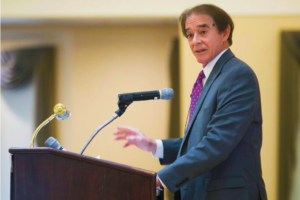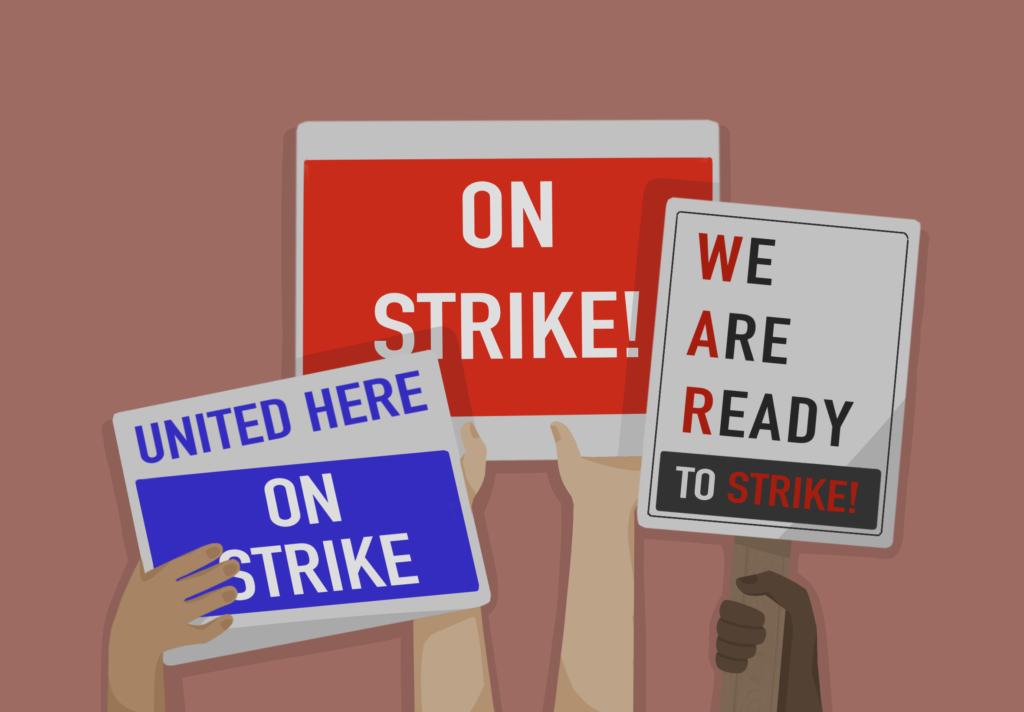
Mayor William Dickinson has spoken out against recreational marijuana legalization. Photo courtesy of Record-Journal
As states across the nation push to legalize recreational marijuana, Connecticut, too, has taken interest — and the debate over the substance’s legalization has now reached Wallingford. Democratic committee leaders announced on Thursday, March 14, that bills in three separate committees would, if passed in the Connecticut General Assembly, fully legalize recreational and commercial marijuana. (Medicinal marijuana has been legal in the state since 2012.) Officials estimated that legalization could yield nearly $170 million in taxes annually. Though some town officials are eager to embrace the new legislation, others have reacted in opposition. On Saturday, March 16, state and local officials expressed their concerns regarding marijuana legalization at the Wallingford Town Hall in a rally organized by Wallingford Mayor William Dickinson.
Provisions in the three bills entail the elimination of criminal records for marijuana possession, driving standards associated with usage, and a tax rate for retailers. Individuals older than 21 would be permitted to possess up to an ounce-and-a-half of marijuana. Additionally, maximum levels of THC would be regulated under this legislation.
Furthermore, towns would be permitted to prohibit or regulate the sale of marijuana. However, most of the legislation would be managed by a proposed division of the Department of Consumer Protection, the Cannabis Control Commission.
According to lawmakers, legalization would help eliminate the underground market, which is estimated to generate nearly $350 million each year. Moreover, criminal charges for marijuana possession have disproportionately affected racial minorities — an issue legalization would directly mitigate.
Mr. Craig Turner, the Director of Youth & Social Services, along with Mr. Ken Welch, the President of Coalition for a Better Wallingford, were involved in the rally’s organization. Police Chief William J. Wright was present along with members of the fire department, and a number of state legislatures.
Mayor Dickinson commented that “the effort was made to voice concerns — not opposition to marijuana — again, concern about public health. If marijuana is safe for public health, fine. If it’s not, then, no, it’s not good. But the issue is following proper protocols.” Mayor Dickinson clarified that he is neither in favor nor opposed to marijuana, but, rather, is simply aiming to verify its potential risks.
Mr. Jesse Reynolds, who is currently seeking the Democratic nomination for Town Council and who did not attend the rally, commented, “My main issue with [opposition to legalization] is that popular opinion is in favor of it, other states have already done it, and if the Town of Wallingford and the area was really worried about the repercussions, then maybe they [would] focus their efforts on how they’re going to address the zoning issues, the ordinance issues, that they could put in place ahead of the legislation.” Mr. Reynolds added, “It’s fair to have concerns, and it’s good that elected people have concerns about the safety of the community.” However, Mr. Reynolds fears that opposition to legalization may be more politically driven than anything. He explained, “I’m of the opinion that they’re just taking the other side of the issue because there is another side.”
Regarding legalization, Mayor Dickinson emphasized, “The number one issue is public health.” Amidst the debates over legalization in Connecticut, Mayor Dickinson reflected on the legalization of medical marijuana and added that “there are 36 or 37 medical conditions that they’re saying you can use medicinal marijuana for, but there’s no testing that shows it’s good for any of them. So, on what basis are we deciding that this is good for public health or not good for public health? There seems to be no science involved. It’s all a matter of whether you like it or not.” Although scientists have not conducted enough clinical trials to provide conclusive evidence for the medical benefits of marijuana, certain studies have supported its ability to treat chronic pain, anxiety, cancer, MS, and nausea and vomiting caused by chemotherapy.
Mayor Dickinson also drew attention to the severity of the opioid crisis. He remarked that though opioids were initially approved for short-term use, long-term addiction has become a serious issue. He added that nearly $13 billion has been appropriated to deal with the opioid crisis, and in 2019 alone, almost $750 million dollars has been allocated to identify alternatives to opioids. Regarding marijuana, he stated, “Why would we not want to make sure that this is not opening a door to another problem?”
Though federal organizations, including the Centers for Disease Control and the Department of Health and Human Services, have stated that marijuana has no medical benefits, 11 states have approved marijuana for medical purposes. Mayor Dickinson fears that the government is not delivering a clear message. And in Connecticut, the state’s health department has not taken a position on the legalization of either recreational or medicinal marijuana. Additionally, physicians are not permitted to prescribe medical marijuana, and hospitals, since they are regulated by federal legislation, can’t legally prescribe marijuana. Mayor Dickinson commented, “So we’re letting the patient decide what they should use without the testing requisite to say this is okay? It’s unbelievable to me.” He added, “Why is marijuana getting a big pass on such basic standards for providing public health?”
Regarding the impact of marijuana legalization in Wallingford, Mayor Dickinson worried that “once it proliferates, once legalization occurs, there are a lot of people who will assume it’s okay.” He added that though legislation would include an age limit on the use of marijuana, it is probable that younger populations will have great accessibility to the substance.
Mr. Reynolds acknowledged a number of studies that proved association between cannabis and health issues like psychosis, but no significant causal patterns have been established. Regardless, Mr. Reynolds commented that “there should be regulation. They should regulate the content of the cannabis that’s being consumed” — something that is not possible on the underground market.
As the conversations about marijuana’s legalization continue, Mayor Dickinson concluded, “It must be an ongoing effort to hopefully have as many people as possible think about the consequence.” Last Monday, the General Law Committee of the Connecticut legislature approved one of the three recreational marijuana bills, but this bill must still be approved by the Connecticut State Senate and House of Representatives.




